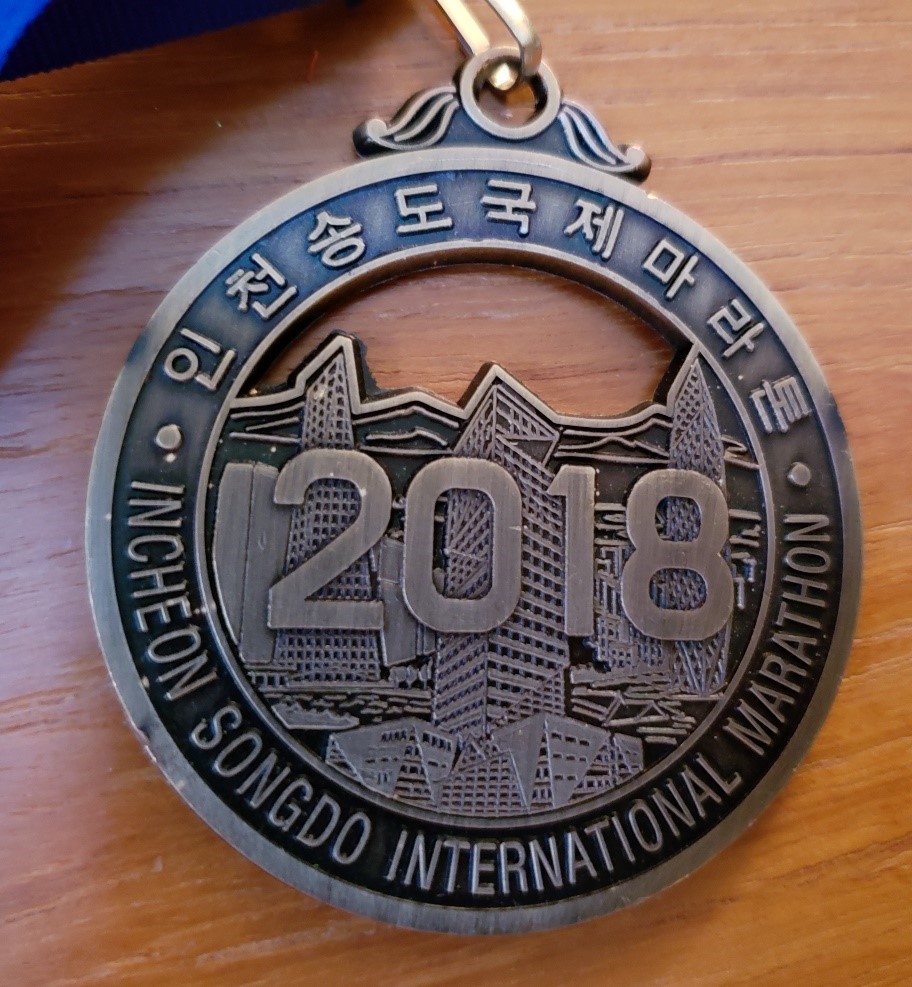2018 Incheon SongDo International Half Marathon by Sam Kozaitis
Imagine trying to create a text message in English but you only have a Chinese keyboard. People in 15th century Korea faced a similar problem because they had no alphabet of their own. To allow the common folks to communicate better, the ruler of Korea at the time, Sejong the Great, created a simple and efficient alphabet known as Hangul, and October 9 is a national holiday in South Korea that commemorates his invention. One of the celebrations for the day is the Incheon Songdo International Half Marathon that takes place in Incheon, South Korea.
Sejong the Great would have been impressed with the efficiency of the Songdo part of Incheon, an ultra-modern city where taxis run on natural gas down sensor-laden streets between high-rise apartment buildings with electronic toilets and a unique system where trash is sucked directly into collection plants. Parts of the city are densely populated, and restaurants are ubiquitous, stacked three and four stories on top of each other. The night before the race, my hosts insisted on taking me to a large traditional Korean dinner, and since my eating and sleeping were so off, I indulged. I was concerned that the eel, squid, octopus, and many little bowls of unrecognizable foods might not agree with me, but I turned out to fine the next morning.
From my luxurious but affordable hotel room on the 55th floor, I had an entire long wall of floor-to-ceiling windows with great views of the city including the route for the race that started on the grounds of Incheon National University. The course went through the center of Incheon and back, then to the western edge of the city, then along a road by the Yellow Sea to the east side and back. The word “marathon” seemed to be used quite loosely there, because it included 5K/10K/half- and full-marathons, and over 10,000 people were expected, including an elite international group.

An argument can be made that one deserves a medal just for being a non-Korean speaker who makes it to the starting line. Registering for the race was difficult because a local bank account is needed, and the race website is almost entirely in Korean. Picking up my bib took some time because, although the people were very friendly, very little English was spoken. The native culture expects deference to elders, so I cheated a bit by guilting my younger Korean host into help me with the whole registration process.
It was about 65 degrees at the 9 am start, and the humidity was low. Just before we went to the starting corrals, there was a performance by a “K-Pop Girl Band”, and then we did some group exercises. Running seems to be quite the thing in South Korea because there must have been over 80 running clubs represented, each with its own booth. The full- and half-marathons started together, followed by the other races, and I ran the half marathon. We started with a military band playing and went down a 10-lane road through the heart of the city. It was fairly jammed up in the first few miles, similar to a typical weekend evening in Incheon but without cars, and without motorcycles driving on the sidewalks.
Next, we turned around and headed back to near the start, where a group was playing traditional Korean drums. Here was the first of two critical turns for the different courses. The routes were well-marked, but in Korean. I’m glad that I memorized the course and the word symbols distinguishing the half and full courses. Sejong would have been proud.
After the turn we passed an art center, then rows and rows and rows of high-rise apartments, some still under construction. I was told chocolate pie would be available at some water stops, and I was excited about that, but all I saw was what appeared to be tofu. Fortunately, before it was too late, I found that these were actually sponges soaked in cold water.
After turning back to the University, we passed a golf course that was bordering the Yellow Sea and then continued past the drums again toward the east end of the city. The police were doing a great job of keeping cars off the roads, which was much appreciated because, in my limited time here, it seems that driver’s education must have included watching the 1975 classic movie, Death Race 2000.
After the second critical turn at about mile 10, I saw that I was maintaining my half-marathon pace pretty consistently, so I dug in a little deeper to compensate for being jammed-up at the start. As I progressed towards the finish, I got some yells from the crowd, which I imagined was them saying “Go, foreigner” which is how they refer to the non-natives there.
After the race I was handed a goodie bag with my medal, and I found that I like frozen mango on a stick very much but azduki bean-stuffed muffins not so much. There were no garbage cans to be found, so people made piles of trash the best that they could, however when the wind kicked up the system seemed to be seriously flawed. Although I didn’t win an award, I turned in a good time and was pleased with by my 97th position finish. One could say this illustrates the old Korean saying: “Even though a tiger is biting you, if you gain consciousness, you can live.”